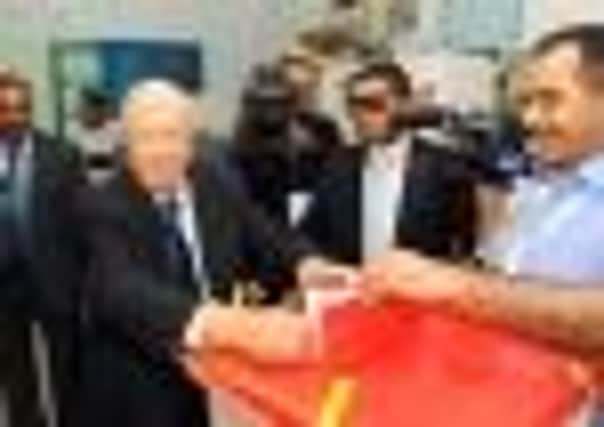Born again Tunisia goes to the polls a democratic nation


“Now I feel like a Tunisian!” said Mahjou Ben Farhat, a 43-year-old shopkeeper, while waiting in a queue to vote along with women in designer sunglasses and elegant outfits, others in the more traditional hijab, and a Berber man in a straw hat.
Rachid Ghannouchi, the leader of the Islamist Ennahda party predicted to win the biggest share of the vote was heckled outside a polling station by people shouting “terrorist”, highlighting tensions between Islamists and secularists being felt across the Arab world.
Advertisement
Hide AdAdvertisement
Hide AdMr Bouazizi’s dramatic suicide, prompted by despair over poverty and government repression, provoked mass protests which forced president Zine El-Abidine Ben Ali to flee Tunisia after 23 years of autocratic rule. This in turn inspired revolts in Egypt, Libya, Yemen and Syria.
“I think that Ben Ali can now see the real value of Tunisian people,” said Marwen Hamadan, a 23-year-old architecture student who said he voted for the Communist party. Like many he is worried about an Ennahda victory. “I don’t want to live with Islamic ideology,” he said.
“Tunisia is a diverse civilisation, it is a mix of political and religious opinions,” he said.
“This is an historic day,” Mr Ghannouchi himself said in the queue outside a polling station in the El Menzah 6 district of the capital.
“Tunisia was born today. The Arab Spring was born today.”
As he emerged from the polling station, about a dozen people shouted at him: “Degage”, French for “Go away”, and “You are a terrorist and an assassin! Go back to London!”.
Mr Ghannouchi, who spent 22 years in exile in Britain, has associated his party with the moderate Islamism of Turkish prime minister Tayyip Erdogan. He has said he will not try to impose Muslim values on society.
“Islam should be respected again in Tunisia,” said Hasna Ben Zid, a 38-year-old woman wearing a hijab. “That’s why I’m going to vote for the only Islamic party.”
The vote is for an 217-member assembly that will draft a new constitution to replace the one Mr Ben Ali manipulated to entrench his power. It will also appoint an interim government and set elections for a new president and parliament.
Advertisement
Hide AdAdvertisement
Hide AdMost forecasts are that Ennahda will not have enough seats for a majority in the assembly, forcing it to seek a coalition which will dilute the Islamists’ influence.
Ennahda has been at pains to assuage the concerns of secularists and Western powers. Yet observers say there is tension inside the party between Mr Ghannouchi’s moderate line and more vehement Islamists among the rank-and-file.
Kamel Jandoubi, head of the independent commission organising the vote, said turnout was over 70 per cent – a level of voter interest never seen during Mr Ben Ali’s rule.
“This is the first time I have voted,” said Karima Ben Salem, 45, at a polling station in the Lafayette area of central Tunis.
“I’ve asked the boys to make their own lunch. I don’t care ... Today I am not on duty. Or rather, I am on duty for my country,” she said.
There were long lines of voters too in Sidi Bouzid, the dirt-poor birthplace of the Tunisian revolution and Mr Bouazizi’s home town. “It’s the first time I’ve voted because it’s the first time I feel my vote is safe,” said Sara Naji, a secondary school teacher.
“We suffered a lot from pessimism and frustration but now we’re building a new life.”